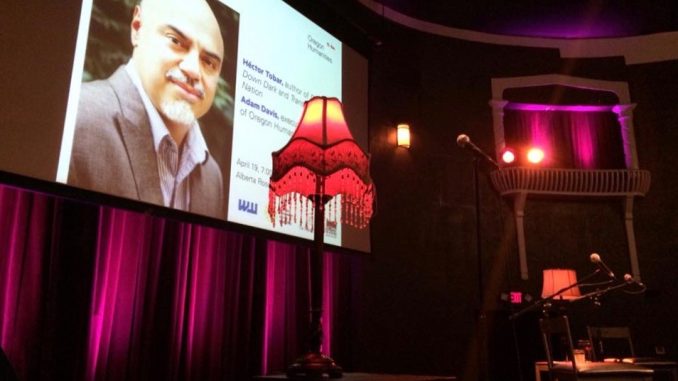
Héctor Tobar’s fascinating life and impactful writing will be the centerpiece of a lively night on campus that the public can buy tickets to
By Helen Harlan
When Chico State Assistant Professor of History Dr. Gloria Lopez kicks off a new semester of classes, she often starts with an activity she calls an icebreaker. Lopez asks her students to write a poem beginning with two simple words, “I am,” followed by a blank space.
The students give it some thought and then share their findings with the class.
“‘I am the first generation. I am from Gridley. I am from (it could be) Reno. Any of the above,” Lopez explained, sharing examples. “It was a good way to get students thinking about how they identify, and what’s interesting to them. They find commonalities.”
Commonalities – and the concept of shared culture and identity – are just some of the themes that Lopez hopes to explore when Chico State welcomes Pulitzer Prize-winning journalist and author Héctor Tobar for its annual Book in Common event on Thursday, April 10.
Tobar, a professor of English and Chicano/Latino Studies at UC Irvine, will present his book “Our Migrant Souls: A Meditation on Race and the Meanings and Myths of ‘Latino.'” His talk will be followed by a Q&A and book signing. The in-person event starts at 7:30 p.m. in Laxon Auditorium and tickets are $27 for adults, $17 for 17 and under. It’s free to Chico State and Butte College students.
“Our Migrant Souls” is Tobar’s sixth published book. In it, he “delivers a definitive and personal exploration of what it means to be Latino in the United States right now,” according to goodreads.com, where the title holds an impressive 4.27 stars.
Lopez is interested in how “Our Migrant Souls” will create conversations with the almost 40% of Chico State students who identify as Latino, Hispanic and Latinx.
“We are a Hispanic Serving Institution, and yet we don’t always center conversations about how we’re serving our Latinx students, faculty and staff, community members,” Lopez noted. “This might be an anchor for those conversations.”
Chico State’s Book in Common program began in 2000. The author’s talk is the culmination of an academic year’s worth of programming around the year’s chosen book: It includes a Community Read Challenge, a Book Discussion Group and a series of engaging chapter discussion questions, all available on Book in Common’s website.
“Those questions were drafted by Professor Lopez and myself, with some other help from planning team members,” said Laura Nice, Book in Common Coordinator and a Chico State lecturer in comparative literature and humanities. “There is a group of over 20 faculty, staff and students on the Book in Common planning team. I want to give credit to the larger group for helping us do this work and making it really impactful with programming throughout the academic year.”
Tobar grew up in Los Angeles. In his 2019 New Yorker essay, “The Assassin Next Door,” Tobar wrote about his family’s Guatemalan immigrant experience and childhood proximity to Martin Luther King’s assassin, James Earl Ray. The essay was turned into a chapter in “Our Migrant Souls.”
“I think if any of us scratches deep enough in our personal histories, we’ll find some connection to the crazy, violent strands of American history,” Tobar said in an email for this story.
Like Tobar, Lopez is originally from the City of Angels, a shared experience she hopes will create great conversations during Tobar’s Chico visit.
“I actually can’t wait to talk to Tobar about it,” Lopez acknowledged. “Teaching about Los Angeles in Northern California, I kind of have to take a step back to describe it. I realized that (Tobar and I) are from two completely distinct neighborhoods. He grew up in East Hollywood; I grew up in the Westlake/MacArthur Park area. It’s interesting to be able to talk to students about it and to be able to share that with them. I can see a lot of the places and spaces he talks about.”
Tobar said he’s excited about engaging the Chico State and Butte College communities because meeting students feeds his soul.
“It’s not just that it’s gratifying to meet people who’ve read your books,” Tobar reflected. “It’s that when you meet them, you learn something about the world you’re living in and how the act of writing and reading can connect people.”
And, in the case of Book in Common, it connects the people of Butte County and beyond all in one place on one night.
“If I’m honest, you don’t read too many books that really reflect a Latinx experience,” Lopez offered. “We have more of them now. I can admit that, as opposed to when I was a student, but I hear my students often say, ‘This is the first one,’ or ‘This is maybe the second one.’ We can never underestimate the power of a book like this. I can’t imagine having taught this year without this book.”

Be the first to comment